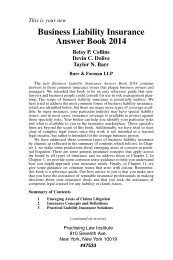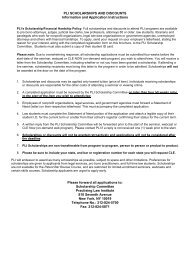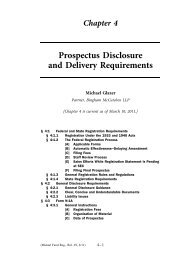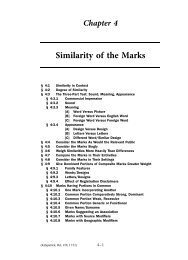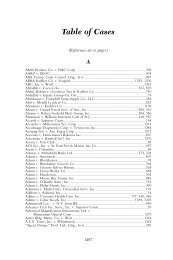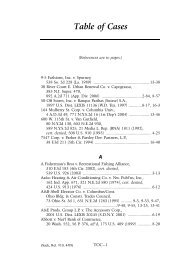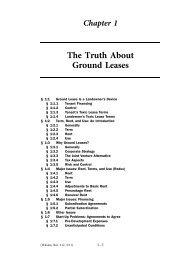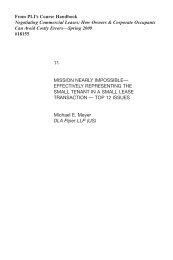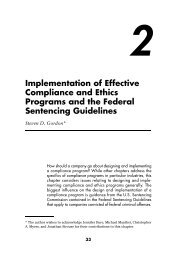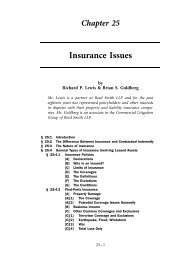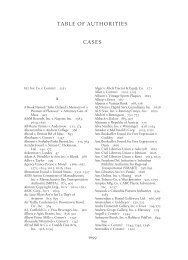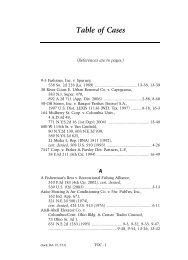Breach of Fiduciary Duty
Breach of Fiduciary Duty
Breach of Fiduciary Duty
You also want an ePaper? Increase the reach of your titles
YUMPU automatically turns print PDFs into web optimized ePapers that Google loves.
<strong>Breach</strong> <strong>of</strong> <strong>Fiduciary</strong> <strong>Duty</strong> § 7:2.3<br />
statutory cap may, however, be inapplicable in specified situations. 134<br />
Several cases have challenged the constitutionality <strong>of</strong> caps on punitive<br />
damages, with varying results. 134.1<br />
A number <strong>of</strong> states have enacted statutory provisions requiring a<br />
portion <strong>of</strong> any punitive damage award to be paid to the state. 134.2<br />
<strong>of</strong> $250,000); IND. CODE ANN. § 34-51-3-4 (greater <strong>of</strong> three times<br />
compensatory or $50,000); KAN. STAT. ANN. § 60-3702(e) (generally, limit<br />
is lesser <strong>of</strong> annual gross income <strong>of</strong> defendant or $5,000,000); MISS. CODE<br />
ANN. § 11-1-65(3) (ceiling dependent upon net worth <strong>of</strong> defendant);<br />
MONT. CODE ANN. § 27-1-220(3) (may not exceed lesser <strong>of</strong> $10 million<br />
or 3% <strong>of</strong> defendant’s net worth; not applicable to class actions); NEV. REV.<br />
STAT. § 42.005(1) (three times the amount <strong>of</strong> compensatory damages if<br />
compensatory damages are $100,000 or more; $300,000 if compensatory<br />
damages are less than $100,000); N.J. STAT. ANN. § 2A:15-5.14(b) (greater<br />
<strong>of</strong> five times compensatory damages or $350,000); N.C. GEN. STAT. ANN.<br />
§ 1D-25(b) (shall not exceed greater <strong>of</strong> three times compensatory damages<br />
or $250,000); N.D. CENT. CODE § 32-03.2-11(4) (may not exceed greater<br />
<strong>of</strong> two times compensatory damages or $250,000); OKLA. STAT. ANN. tit.<br />
23, § 9.1 (cap depends upon reprehensibility <strong>of</strong> conduct); TEX. CIV. PRAC.<br />
& REM. ANN. § 41.008 (shall not exceed two times compensatory<br />
damages, an amount equal to non-economic damages, not to exceed<br />
$750,000, or $200,000) VA. CODE ANN. § 8.01-38.1 (not to exceed<br />
$350,000). Where the statutory cap is a specified dollar amount, questions<br />
<strong>of</strong> interpretation may arise. See, e.g., Bagley v. Shortt, 261 Ga. 762,<br />
410 S.E.2d 738, 739 (Ga. 1991) (holding that cap <strong>of</strong> $250,000 in a “case”<br />
means that $250,000 is the maximum amount <strong>of</strong> money that finder <strong>of</strong><br />
fact may award to any one plaintiff regardless <strong>of</strong> the number <strong>of</strong> defendants<br />
and the number <strong>of</strong> theories <strong>of</strong> recovery).<br />
134. See, e.g., ARK. CODE ANN. § 16-55-208(b) (cap not applicable where<br />
plaintiff harmed by a course <strong>of</strong> conduct intended to injure); COLO. REV.<br />
STAT. § 13-21-102(3) (permitting court to increase award <strong>of</strong> punitive<br />
damages to an amount not exceeding three times actual damages if<br />
defendant engages in specified conduct during the pendency <strong>of</strong> the case);<br />
FLA. STAT. ANN. § 768.73(b) (no cap where defendant had specific intent to<br />
injure claimant and did injure claimaint); GA. CODE ANN. § 51-12-5.1(f)<br />
(no limit where defendant acted or failed to act with "specific intent to<br />
cause harm"); KAN. STAT. ANN. § 60-3702(f) (if pr<strong>of</strong>itability <strong>of</strong> misconduct<br />
exceeds statutory cap, court may award an amount equal to one-and-onehalf<br />
times the amount <strong>of</strong> the defendant’s gain or expect gain from the<br />
misconduct); NEV. REV. STAT. § 42.005(2) (cap inapplicable in five situations<br />
not relevant to accountant liability cases); TEX. CIV. PRAC. & REM.<br />
ANN. § 41.008(c) (cap not applicable where conduct is one <strong>of</strong> a number <strong>of</strong><br />
specified felonies).<br />
134.1. Compare Wackenhut Applied Techs. Ctr., Inc. v. Sygnetron Prot. Sys., Inc.,<br />
979 F.2d 980 (4th Cir. 1992) (holding Virginia provision does not violate<br />
due process provisions <strong>of</strong> Virginia or United States Constitutions), with<br />
Henderson v. Ala. Power Co., 627 So. 2d 878 (Ala. 1993) (finding Alabama<br />
provision violated Alabama constitutional guarantee to trial by jury).<br />
134.2. See, e.g., IND. CODE ANN. § 34-51-3-6(c)(2) (75% to treasurer <strong>of</strong> state for<br />
deposit into violent crime victims compensation fund); IOWA CODE ANN.<br />
§ 668a.1(2)(b) (if conduct not directed specifically at claimant, an amount<br />
(Goldwasser & Arnold, Rel. #14, 10/11)<br />
7–25



